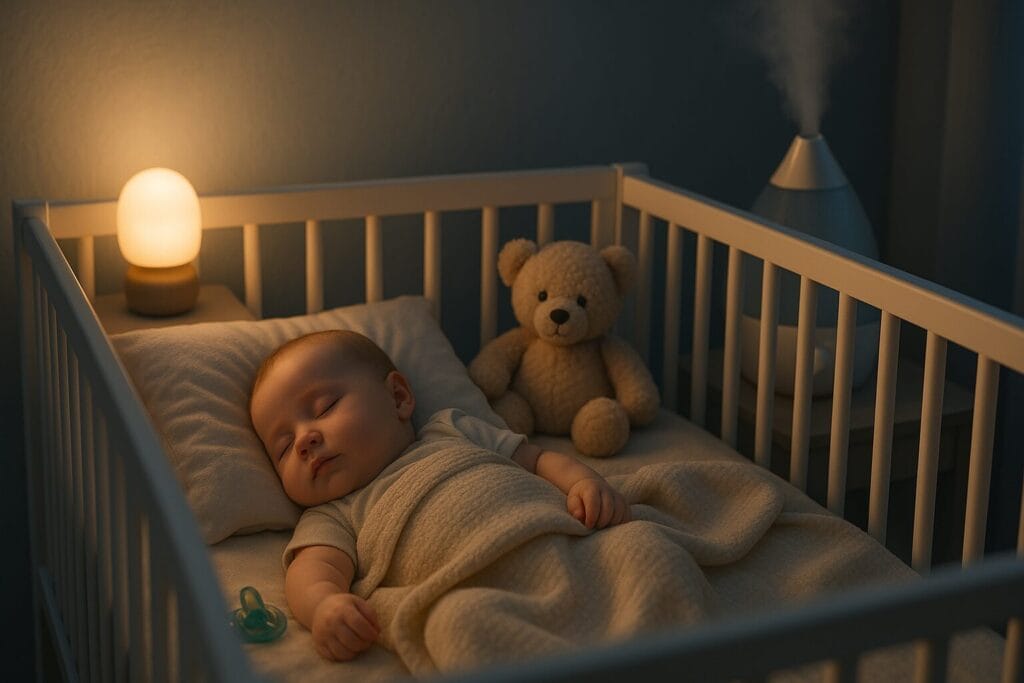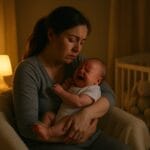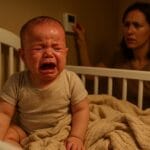As parents, worrying when your baby isn’t sleeping well is natural. Babies are known for their sleep-heavy schedules; any deviation can feel alarming. One common concern parents often face is whether do babies sleep more when sick. While it’s normal for a baby to change their sleep pattern when under the weather, understanding why this happens can help put your mind at ease. In this article, we’ll explore how illness can affect a baby’s sleep patterns and provide insight into the factors contributing to these changes.
Table of Contents
Understanding Sleep in Babies
Before discussing how illness affects sleep, it’s helpful to understand how sleep works in babies. Babies sleep a lot, typically between 14 and 17 hours a day during the first few months of life. However, this sleep isn’t continuous. Babies experience short sleep cycles, typically around 50 minutes, compared to adults, whose cycles last 90 minutes.

These cycles involve deep sleep (REM, or rapid eye movement sleep) and light sleep. REM sleep is particularly important because it supports brain development, memory formation, and physical growth. As babies’ sleep patterns mature, they start sleeping for longer stretches.
So, do babies sleep more when sick? In many cases, sickness can lead to changes in both the quantity and quality of sleep. However, the reasons behind these changes vary. Let’s take a closer look at how illness affects sleep and whether do babies sleep more when sick.
How Illness Affects Babies’ Sleep
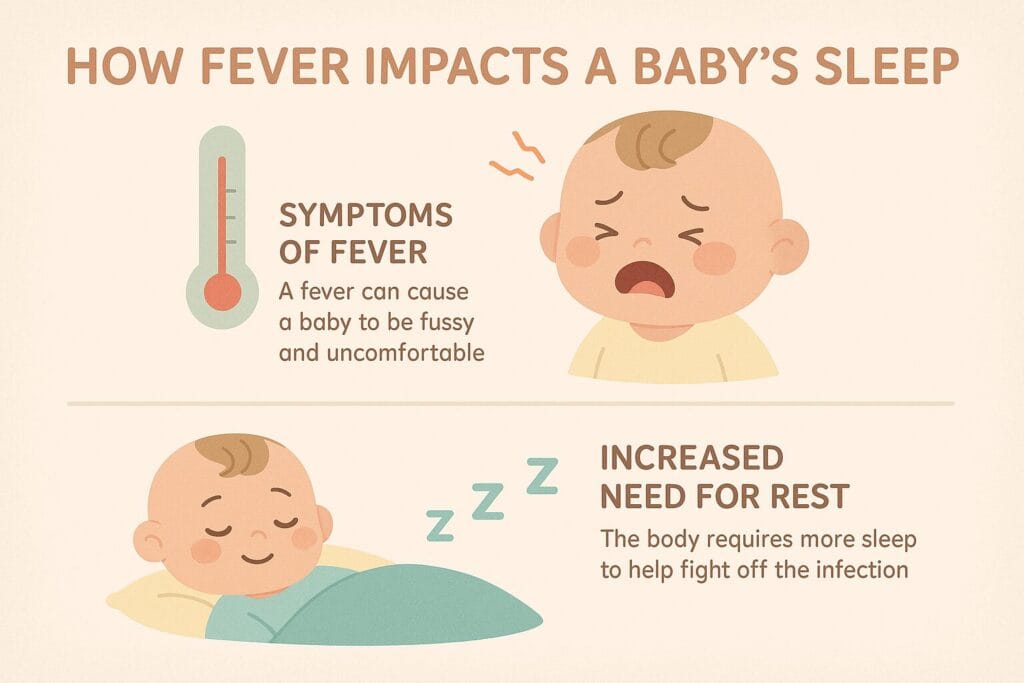
When a baby is sick, their body works hard to fight the infection or illness, and sleep plays a significant role in recovery. Just as adults might feel exhausted and need more rest when unwell, babies can experience the same thing. However, the type of illness can impact sleep in different ways.
If you’re struggling with your 5-month-old waking every hour, explore expert advice on improving your baby’s sleep patterns and getting better rest for both of you.” Read more here.
Here’s a breakdown of how common ailments affect sleep patterns:
1. Fever and Sleepiness
Fever is a typical symptom of many illnesses, ranging from mild colds to more serious infections. When babies have a fever, they often feel tired and lethargic, leading them to sleep more. Do babies sleep more when sick with a fever? Yes, they often do. Fever signals the body to rest to conserve energy and help fight the infection, making babies more likely to sleep longer than usual.
However, although increased sleep is common with fever, it’s also essential to monitor for signs of dehydration or prolonged high fever, as these can be signs of a more serious issue. Do babies sleep more when sick with a fever? Definitely, but be sure to monitor the duration and severity.
2. Congestion and Sleep Disruption
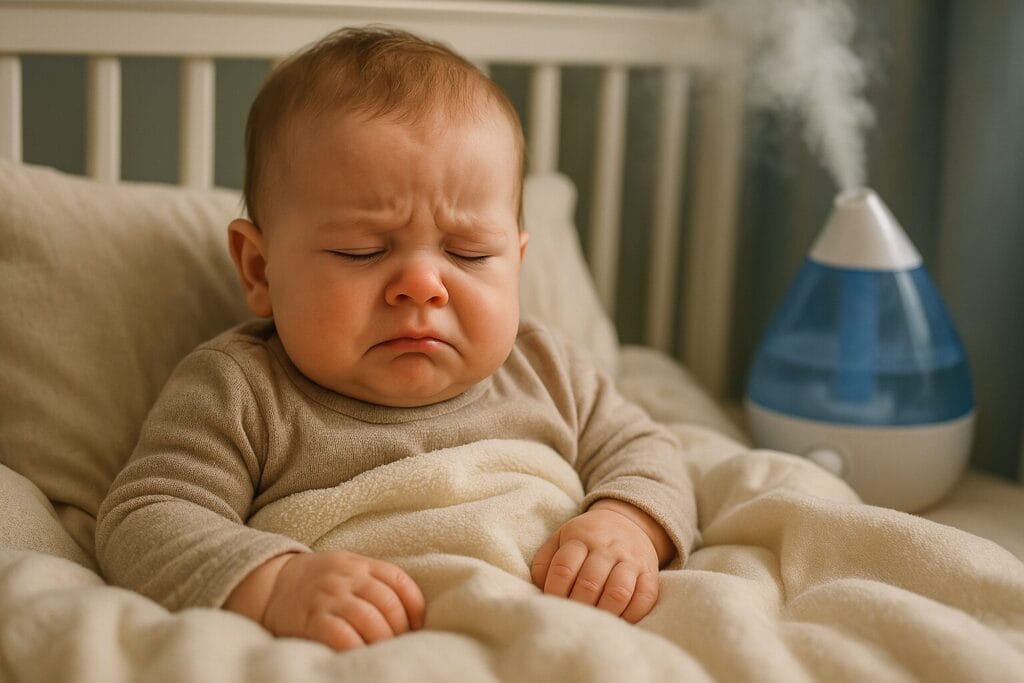
When babies catch colds, they often experience nasal congestion, making it hard for them to breathe while sleeping. This can lead to both shorter sleep periods and disrupted sleep cycles. The body’s discomfort from congestion or a sore throat can make it hard for a baby to fall into a deep sleep, which means they may wake more frequently during the night.
Though babies may sleep more during the day while sick, sleep quality can suffer when dealing with blocked airways. Do babies sleep more when sick with a cold or nasal congestion? Yes, but not without interruptions. Using a humidifier in the nursery or employing nasal saline drops can help clear their nasal passages, allowing them to sleep more comfortably.
3. Ear Infections and Sleep Struggles
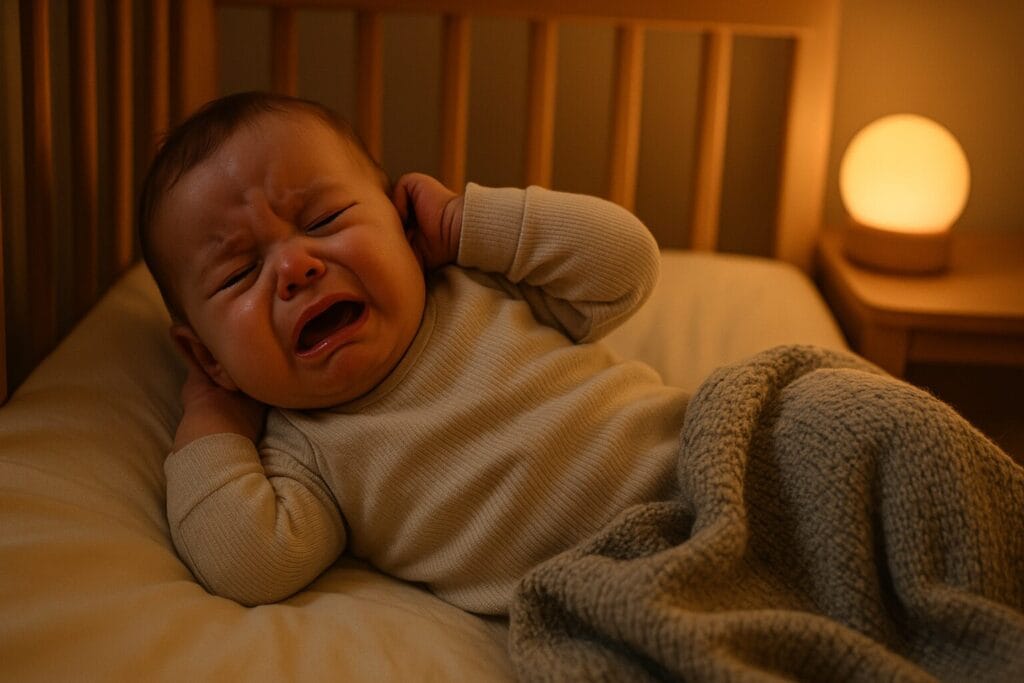
Ear infections are another illness that often impacts sleep. Babies with ear infections can experience intense pain when lying down, which can cause them to wake up crying and make it difficult for them to sleep. Do babies sleep more when sick with an ear infection? In some cases, they might sleep more during the day to compensate for disturbed sleep at night due to the pain.
Ear infections often lead to fussy sleep behavior, and it’s common for babies to wake frequently throughout the night, needing extra comfort. If your baby shows signs of an ear infection (such as pulling at their ears or a high fever), it’s important to consult a pediatrician for proper treatment. Again, do babies sleep more when sick with ear infections? They may, but expect more night-wakings.
4. Teething and Interrupted Sleep
Teething is another condition that can disrupt a baby’s sleep, though it doesn’t usually cause a significant increase in sleep time. However, a teething baby may sleep more during the day due to the increased discomfort and pain they experience at night. Teething can make babies feel irritable, and while they may sleep more overall, their sleep cycles are often disturbed due to discomfort.
Teething pain may also lead to more frequent nighttime awakenings. Offering teething rings or using other teething remedies (such as gentle gum massage) can provide some relief and help improve your baby’s sleep. Do babies sleep more when sick from teething? Sometimes, but the quality of their sleep may still suffer due to pain.
Do Babies Sleep More When Sick?
Now, let’s address the key question: Do babies sleep more when sick? In general, yes, babies often sleep more when ill, especially if they have a fever or feel lethargic.
When sick, babies’ bodies are working hard to fight off infections, and sleep plays an important role in this process. The immune system is most active during sleep, so babies’ bodies naturally seek rest to recover. However, this increased sleep is not always continuous or restful. Illness can disrupt sleep quality due to pain, discomfort, or congestion.
Babies may sometimes sleep more during the day but wake up more frequently at night due to discomfort or pain. This is why, while sick, babies may appear to be getting more sleep overall, but they might be missing out on the deep, restorative sleep they need to fully recover.
When to Be Concerned About Sleep Changes
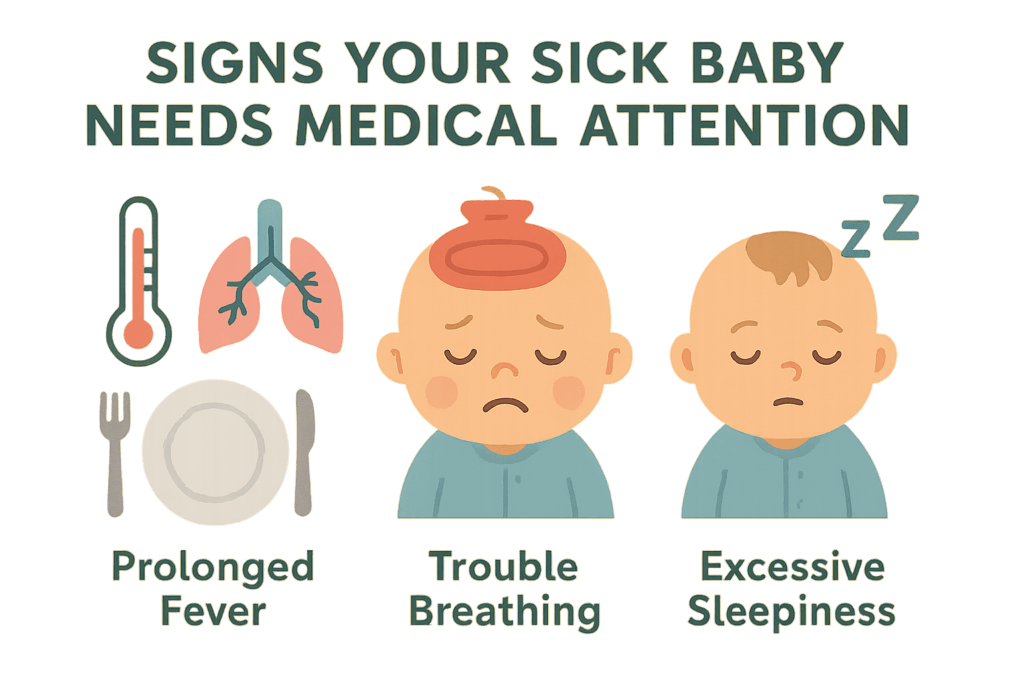
While it’s normal for babies to sleep more when they are sick, certain changes in their sleep patterns or behaviors could be a sign of a more serious issue. Do babies sleep more when sick? Yes, but it’s important to monitor the quality and consistency of their sleep. If your baby is sleeping excessively or experiencing other concerning symptoms, it’s crucial to pay attention. Here are some warning signs to look out for:
1. Prolonged Sleepiness and Difficulty Waking
It’s natural for babies to sleep longer when they are sick, as rest helps their bodies fight off infections. However, excessive sleepiness can indicate something more serious. If your baby is extremely difficult to wake, appears overly lethargic, or sleeps for much longer than usual without showing signs of alertness, it could signal an underlying condition, such as a severe infection or dehydration.
- Do babies sleep more when sick? Yes, but if they seem unable to stay awake for feeding or responding to your touch, their body may be overwhelmed by an illness. Prolonged sleepiness combined with a lack of alertness can be a cause for concern, as it may point to a serious issue that requires medical attention.
- What to look for: Difficulty waking, limpness, unresponsiveness, or a lack of interest in their surroundings or feedings could indicate a need for urgent medical attention.
2. Breathing Issues: Difficulty and Labored Breathing
One of the most concerning signs in a sick baby is difficulty breathing. If your baby shows signs of labored breathing or seems to struggle to take breaths, it’s time to seek medical help. Breathing problems can be a sign of respiratory distress, and it’s crucial to act quickly. Signs of labored breathing include:
- Flaring nostrils or widening of the nose with each breath
- Rapid chest movements or shallow breathing
- Wheezing or high-pitched sounds when exhaling
- Do babies sleep more when sick? Yes, but respiratory distress, especially if it interferes with sleep or causes your baby to wake up often, is a serious concern. If you notice your baby struggling to breathe, seek medical attention immediately, as this could indicate conditions such as bronchiolitis, pneumonia, or asthma.
- What to do: If your baby is having difficulty breathing or you notice irregular breathing patterns, contact your pediatrician or visit the ER as soon as possible.
3. Persistent High Fever
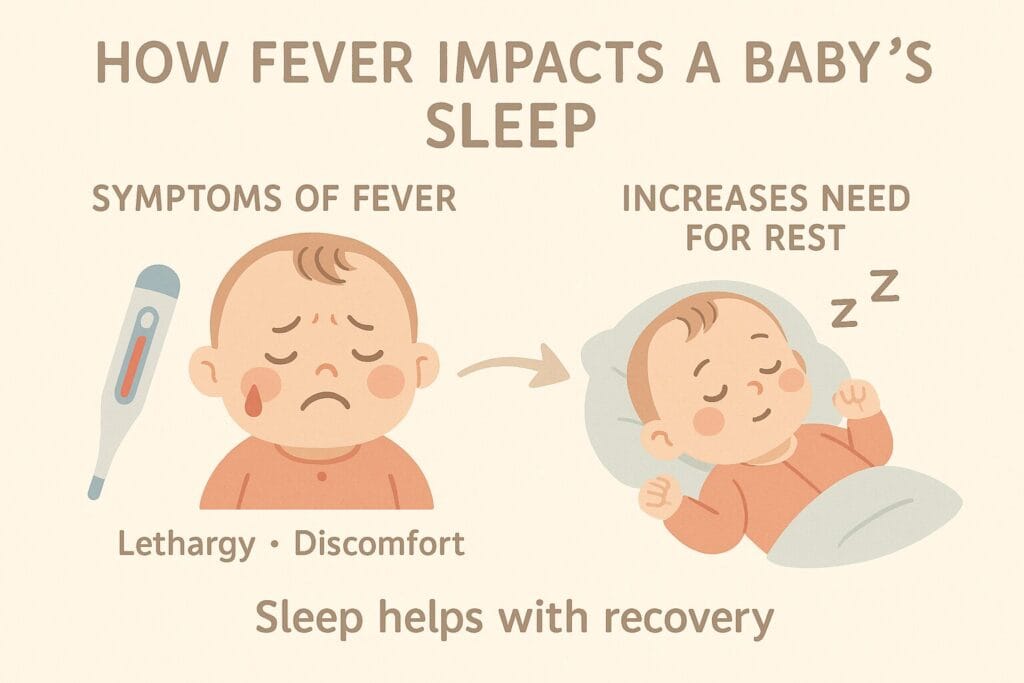
Fever is common in sick babies, but persistent high fevers can be a sign of a more serious illness. If your baby’s fever lasts for more than a couple of days or if the temperature spikes above 104°F (40°C), it’s important to consult with a healthcare professional. High fever in infants can be dangerous, especially if it’s accompanied by other symptoms such as lethargy, irritability, or a rash.
- Do babies sleep more when sick? Yes, they may sleep more due to fever-induced fatigue. However, a high fever that doesn’t respond to fever-reducing medication or lasts more than 48 hours requires professional evaluation.
- What to do: Use fever-reducing medication as directed by your pediatrician, but if your baby’s fever persists or exceeds 104°F (40°C), it’s time to call the doctor. Seek immediate medical attention if the fever is accompanied by a seizure or significant changes in your baby’s behavior or alertness.
4. Loss of Appetite and Refusal to Feed
When your baby is sick, it’s common for them to have a reduced appetite. However, if your baby refuses to feed completely or shows a significant loss of interest in eating, this could indicate a more serious problem. Loss of appetite, especially when combined with vomiting, diarrhea, or a fever, may be a sign of dehydration, a gastrointestinal infection, or other more serious conditions that require medical attention.
- Do babies sleep more when sick? Yes, but if a baby is refusing to eat and excessively sleeping, it can signal that their body is struggling to get enough nutrition, which could impact their recovery.
- What to do: Monitor your baby’s feeding habits and look for signs of dehydration, such as fewer wet diapers, dry mouth, or sunken soft spots on the head. If your baby is consistently refusing to feed or showing signs of dehydration, contact your pediatrician immediately to ensure they receive the right care.
5. Unexplained Behavior Changes
While it’s normal for babies to feel a little more irritable when they are sick, significant behavioral changes—such as inconsolable crying, extreme fussiness, or sudden difficulty sleeping—could be a sign of something more concerning. If your baby’s temperament or behavior changes suddenly and they seem excessively uncomfortable or unable to settle, it’s important to consult with a healthcare provider.
What to do: If your baby is unusually fussy or inconsolable despite comfort measures, it’s a good idea to reach out to your pediatrician to rule out any serious conditions.
Do babies sleep more when sick? Yes, but unusual fussiness combined with excessive sleep could indicate discomfort that requires more than just time or patience. It might be a sign of ear infections, severe congestion, or other underlying conditions.
How to Help Your Baby Sleep Better When Sick
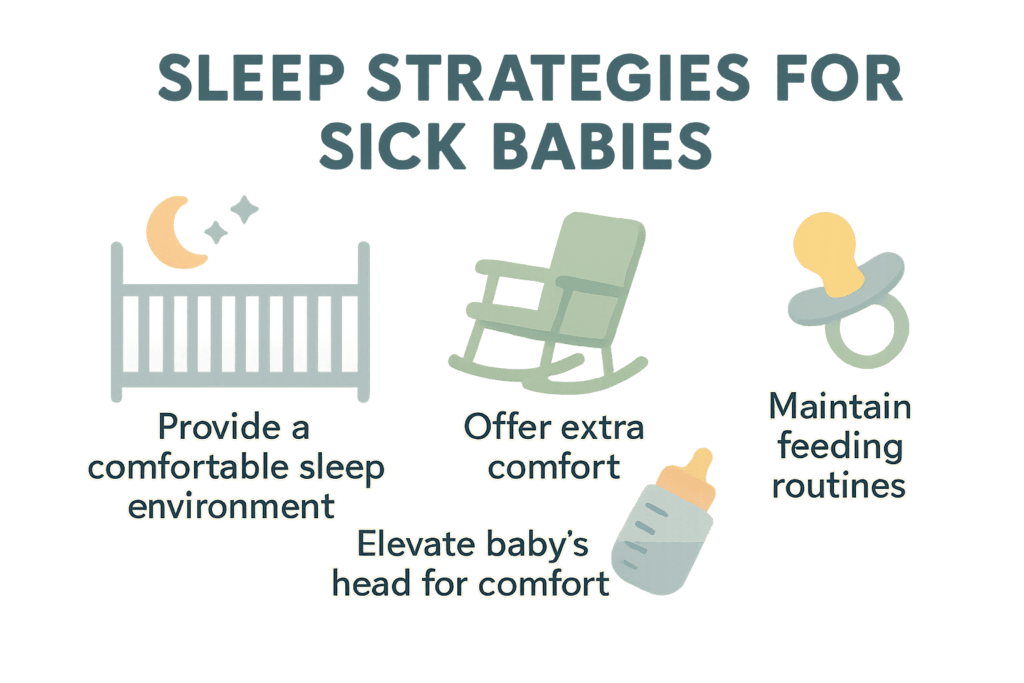
When your baby is sick, it’s not uncommon for their sleep patterns to change. In fact, many parents wonder, “Do babies sleep more when sick?” The answer is yes, babies may sleep more than usual while they are unwell. However, their rest can be disrupted due to discomfort from illness. Thankfully, there are several strategies you can use to help your baby sleep better and feel more comfortable while they recover.
“Dealing with the 8-week sleep regression? Discover proven strategies and tips to help your baby sleep soundly through the night again.” Learn more here.
1. Provide a Comfortable Sleep Environment
A peaceful and cozy sleep environment can help your baby get the rest they need during illness. When babies are sick, their bodies require extra sleep to recover, so creating an environment that supports sleep is essential. Do babies sleep more when sick? Yes, they may, but this increased sleep will only be effective if their environment promotes rest.
- Keep the room dark and quiet: Darkness signals to your baby’s body that it’s time to rest, and a quiet environment prevents disruptions. Use blackout curtains and consider white noise machines if background noise is an issue.
- Add moisture to the air: Use a humidifier to help ease congestion and dry air that may make breathing more difficult. A humidified room can help keep your baby’s airways moist, making it easier to breathe and, therefore, sleep more soundly.
- Clear your baby’s nose: If your baby has a stuffy nose, saline drops or a bulb syringe can be helpful in clearing the nasal passages, making it easier for your baby to breathe while sleeping. Congestion can prevent restful sleep, so these measures can be particularly effective when your baby is sick.
“Dealing with the 8-week sleep regression? Discover proven strategies and tips to help your baby sleep soundly through the night again.” Learn more here.
2. Offer Extra Comfort
When your baby is sick, they may be feeling more sensitive and irritable, which could lead to restless sleep. If your baby is struggling to sleep due to discomfort, offering extra comfort can help soothe them and promote better rest.
- Cuddles and Rocking: Sometimes, babies need extra reassurance during illness. Holding your baby, rocking them gently, or offering a pacifier can provide comfort and help them relax enough to fall asleep.
- Pain Relief: If your baby seems in pain, such as from teething or an ear infection, consult with your pediatrician about safe options for relieving discomfort. Offering extra cuddles during these times can help your baby feel more secure, which may also help them sleep more soundly.
- Soothing Sounds: Soft, calming music or white noise can also comfort your baby and help mask household noises that could disturb their rest.
3. Maintain Feeding Routine
Even if your baby is sick, maintaining their usual feeding routine is important. Hydration and nutrition play a significant role in your baby’s overall comfort and ability to sleep. Babies who aren’t eating or drinking enough can become irritable, which can disrupt their sleep.
- Offer regular feedings: Breastfeeding or formula feeding is important for keeping your baby nourished and hydrated. A full tummy can help them sleep longer and more comfortably, which may be especially important when they are feeling unwell.
- Stay alert to signs of dehydration: Sickness, especially if accompanied by fever or vomiting, can cause your baby to become dehydrated. Keep an eye out for signs such as fewer wet diapers or dry lips, and make sure your baby gets enough fluids to stay hydrated.
4. Use a Comfortable Sleeping Position
Sleep positions can greatly affect how comfortable and restful your baby feels during illness. Do babies sleep more when sick? They may sleep more because they are exhausted, but their position while sleeping also matters for their comfort and recovery.
- Elevate the head slightly: If your baby has congestion or an ear infection, elevating their head slightly during sleep may help ease their discomfort. Propping up the mattress or placing a rolled towel underneath the crib mattress can help relieve congestion.
- Hold them upright: For babies with colds or congestion, holding them in an upright position or sleeping them in a rocking chair or baby carrier can sometimes help them breathe more easily, reducing sleep disturbances.
- Avoid tummy sleeping: If your baby is under 1 year old, always place them on their back to sleep to reduce the risk of Sudden Infant Death Syndrome (SIDS), even when they are sick.
5. Follow Your Baby’s Lead
When your baby is sick, their body may need more rest than usual. While it’s important to maintain a routine, “Do babies sleep more when sick?” Absolutely—they may need extra sleep to recover. If your baby wants to sleep more than usual, it’s okay to let them rest. However, if their sleep patterns become irregular or disrupted due to pain or discomfort, you may need to adjust your approach.
- Allow extra nap time: If your baby is sleeping longer than usual during the day, don’t worry. More sleep during illness helps their body fight infection and recover faster.
- Look for signs of discomfort: If your baby is waking up more frequently during the night and seems in pain, it’s time to reassess the situation. Rest is vital, but consistent discomfort could be a sign of an underlying issue. Contact your pediatrician if you notice symptoms like high fever, trouble breathing, or inconsolable crying.
FAQs: Do Babies Sleep More When Sick?
1. Do babies sleep more when sick?
Yes, babies often sleep more when sick, especially if they have a fever or feel lethargic. However, the quality of their sleep may be affected by discomfort, pain, or congestion.
2. Why do babies sleep more when sick?
When babies are sick, their bodies are working hard to fight infections. Sleep is essential for the immune system to function effectively, and increased sleep helps them recover faster.
3. Can a baby sleep too much when sick?
It’s normal for babies to sleep more when sick, but excessive sleep accompanied by difficulty waking or disorientation can indicate a more serious issue. Always consult a doctor if you’re concerned.
4. Do babies sleep less when they have a cold?
Colds can disrupt a baby’s sleep due to nasal congestion and discomfort. Some babies may sleep more due to fatigue, but they may also wake up frequently due to the discomfort caused by the cold.
5. How long do babies sleep more when sick?
This increased sleep is generally short-term. Once your baby recovers, their sleep schedule should return to normal. The duration varies based on the severity of the illness.
6. How can I help my baby sleep when sick?
Ensure a comfortable sleep environment by using a humidifier, offering regular feedings, and helping relieve discomfort from congestion or pain.
7. When should I be worried about my baby’s sleep when they’re sick?
Consult a doctor if your baby’s sleepiness is excessive, they have difficulty waking up, or if they show signs of breathing trouble, high fever, or loss of appetite.
8. Can teething make babies sleep more?
Teething can disrupt sleep, but some babies may sleep more to cope with the discomfort, especially during the daytime when they feel more exhausted from pain.
9. Does fever make babies sleep more?
Yes, fever often leads to increased sleep as the body conserves energy to fight off the infection.
10. Can ear infections cause babies to sleep more?
Ear infections often cause pain, leading to fussy sleep behavior. Babies may sleep more during the day due to tiredness, but their sleep at night is often disrupted due to the pain.
Conclusion
In summary, do babies sleep more when sick? Yes, most of the time they do, as their bodies need extra rest to recover. While it’s normal for babies to sleep more when ill, keep an eye on their comfort level, and remember that while more sleep is usually a good thing, the overall quality of their sleep is just as important for recovery.
Ultimately, do babies sleep more when sick as a natural response to illness, and is this sleep crucial for their healing? However, if you’re concerned about any changes in their sleep behavior, especially if other symptoms accompany it, don’t hesitate to consult a healthcare professional. Your baby will recover and return to their usual sleep patterns with the right care and comfort.

